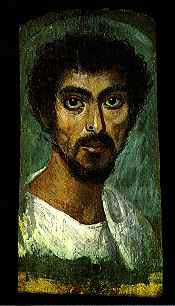 |
|||||
|
|
|||||
 |
|||||
 |
|||||
 |
|||||
|
|
 |
|||||
"Vot ish Art? Id is somedings to drink, objectively foregebrought in de Beaudiful. Doubtest dou? --denn read, as I hafe read, de Dyonisiacs of Nonnus, and learn dat the Upboorstin of infinite worlds into edernal Light und mad goldnen Lofeliness -- yea of dein own soul -- is typifide only py de CUP. Vot! -- shdill skebdigal? Tell me denn, O dou of liddle fait, vere on eart ish de kunst obtain ids highest form if not in a BIERSTADT? Ha! ha! I poke you dere!" Caupo recauponatus, MS. by Fritz Swackenhammer, olim candidatus theologia at Tubingen, shoost now lagerbierwirth in St. Louis. (Dec. 1869.) |
|||||
This essay will discuss the literary culture of Alexandria in the period of Nonnos, arbitrarily set between 400 A.D. and 476 A.D. Epic was a debased form, the Homeric language depleted during the evolution of Koine. Nonnos reset rigorous standards for epic scansion and diction, and his influence was felt as a result of his tremendous tour de force the Dionysiaca. Nonnos, in Alexandria, would have had available a universe of literature to which we have only tantalizing references in secondary sources. Collections of catalogues have survived, containing the first lines of thousands of works which do not otherwise survive. We must assume that Nonnos would have been intimately familiar, as a don is with Shakespeare, with the items constituting our Western Canon. For the quickest and dirtiest way of entering Nonnos' world, through what remains to us, read, and memorize, the following Greek and Roman basics (taken from U.T. Austin Classics Reading List): |
|||||
|
The following persons would have been personally known -- ( * designates a probable contemporary) to Nonnos in Alexandria, or he would have known their writings: MAJOR CHRISTIAN WRITERS in Greek
MAJOR PAGAN WRITERS in Greek
INTERESTING SITES |
|
|
Paraphrase of the Gospel of John by Nonnos of Panopolis Translated from the Greek by M.A. Prost Copyright © M.A. Prost, 1999 Web design by: |